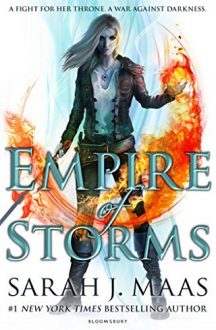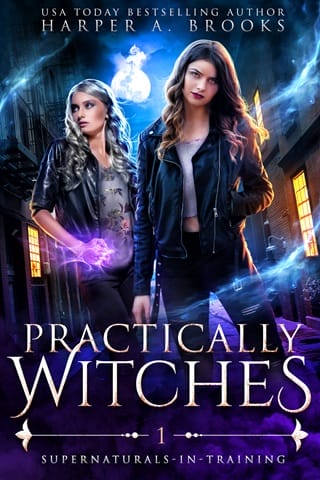Chapter 61
61
They had no choice but to meet them. Maeve’s armada had the wind and the current, and they would not even reach the shore before they were caught. And outrunning Fae soldiers … Not an option.
Rowan and Aedion laid out every course for Aelin. All paths arrived at one destination: confrontation. And she was still so drained, so exhausted, that … She knew how this would go.
Maeve had a third more ships. And immortal warriors. With magic.
It took far too little time for those black sails to fill the sky, for them to glean that their enemy’s boats were better-made, their soldiers longer-trained. Rowan and the cadre had overseen much of that training—and the details they provided were not heartening.
Maeve sent one ornately carved rowboat to them, bearing a message.
Surrender—or be sent to the bottom of the ocean. Aelin had until dawn tomorrow to decide.
An entire day. So that the fear would fester and spread among their men.
Aelin met with Rowan and Aedion again. The cadre was not summoned by their queen, though Lorcan paced like a caged beast, Elide watching with a face that impressively revealed nothing.
She had no solution. Dorian remained quiet, though he often glanced between her and Manon. As if some puzzle were laid before him. He never said what.
Aedion pushed for attacking—quietly rallying the boats and attacking. But Maeve would see that maneuver coming. And they could strike faster with magic than it’d take for them to fire arrows and harpoons.
Time. That was all she had to play with.
They debated and theorized and planned. Rowan made a decent attempt at trying to suggest she run. She let him talk, only to let him realize in doing so what a stupid idea it was. After last night, he should be well aware she was not leaving him. Not willingly.
So the sun set. And Maeve’s armada waited, poised and watching. A lounging panther, ready to strike at first light.
Time. Her only tool—and her downfall. And she had run out of it.
Aelin counted those black sails again and again as night blanketed them.
And had no idea what to do.
It was unacceptable, Rowan had decided, during the long hours they’d debated.
Unacceptable that they had done so much, only to be halted not by Erawan, but Maeve.
She hadn’t deigned to make an appearance. But that wasn’t her style.
She’d do it at dawn. Accept Aelin’s surrender in person, with all eyes watching. And then … Rowan didn’t know what she’d do then. What Maeve wanted, other than the keys.
Aelin had been so calm. Shock, he’d realized. Aelin had gone into shock. Rowan had seen her rage and kill and laugh and weep, but he had never seen her … lost. And he hated himself for it, but he couldn’t find a way out. Couldn’t find a way for her to get out of this.
Aelin was sleeping soundly as Rowan stared at the ceiling above their bed, then slid his gaze over her. He took in the lines of her face, the golden waves of her hair, every moon-white scar and dark swirl of ink. Leaning in, silent as snow in a wood, he kissed her brow.
He would not let it end here, not let this be what broke them.
He knew the house flags that flew beneath Maeve’s own crest. Had counted and cataloged them all day, sorting through the catacombs of his memory.
Rowan slid into his clothes and waited until he’d crept into the hall before buckling his sword belt. Still gripping the doorknob, he allowed himself one last look at her.
For a moment, the past snared him—for a moment, he saw her as he’d first spied her on the rooftops of Varese, drunk and battered. He’d been in hawk form, assessing his new charge, and she’d noticed him—broken and reeling, she had still spotted him there. And stuck out her tongue at him.
If someone had told him that the drunken, brawling, bitter woman would become the one thing he could not live without … Rowan shut the door.
This was all he could offer her.
Rowan reached the main deck and shifted, little more than a gleam of moonlight as he shielded himself and flapped through the briny night—into the heart of Maeve’s fleet.
Rowan’s cousin had enough good sense not to try to kill him on sight.
They were close enough in age that Rowan had grown up with him, raised in his uncle’s house beside him after his parents had faded. If his uncle ever faded, it would be Enda who took up the mantle as head of their house—a prince of considerable title, property, and arms.
Enda, to his credit, sensed his arrival before Rowan slipped through the flimsy shield on the windows. And Enda remained sitting on the bed, albeit dressed for battle, a hand on his sword.
His cousin looked him over head to toe as Rowan shifted. “Assassin or messenger, Prince?”
“Neither,” Rowan said, inclining his head slightly.
Like him, Enda was silver-haired, though his green eyes were speckled with brown that could sometimes swallow the color whole when he was in a rage.
If Rowan had been bred and built for battlefields, Enda was sculpted for intrigue and court machinations. His cousin, while tall and muscled enough, lacked Rowan’s breadth of shoulders and solid bulk—though that could also be from the different sorts of training they’d received. Enda knew enough about fighting to warrant being here to lead his father’s forces, but their own educations had crossed little after those first decades of youth, when they had run wild together at his family’s main estate.
Enda kept his hand on the hilt of his fine sword, utterly calm. “You look … different,” his cousin said, brows twitching toward each other. “Better.”
There had been a time when Enda had been his friend—before Lyria. Before … everything. And Rowan might have been inclined to explain who and what was responsible for this change, but he didn’t have time. No, time was not his ally this night.
But Rowan said, “You look different as well, Prince.”
Enda gave a half smile. “You can thank my mate for that.”
Once, it might have sent a pang of agony through him. That Enda spoke of it reminded him that his cousin might not be a battle-honed warrior, but the courtier was as good as any at marking important details—noting Aelin’s scent, now forever entwined with his own. So Rowan nodded, smiling a bit himself. “It was Lord Kerrigan’s son, wasn’t it?”
Indeed, there was another’s scent woven through Enda’s, the claiming deep and true. “It was.” Enda again smiled—now at a ring on his finger. “We were mated and married earlier this summer.”
“You mean to tell me you waited a hundred years for him?”
Enda shrugged, his grip on his sword lightening. “When it comes to the right person, Prince, waiting a hundred years is worth it.”
He knew. He understood him so damn well that it made his chest crack to think of it.
“Endymion,” he said hoarsely. “Enda, I need you to listen.”
There were plenty of people who might have called for the guards, but he knew Enda—or had. He was but one of several cousins who’d shoved their noses into his business for years. Tried, Rowan now wondered, not for gossip but … to fight to keep some small scrap of him alive. Enda more than any of them.
So Endymion gave him the gift of listening. Rowan tried to keep it concise, tried to keep his hands from trembling. In the end, he supposed his request was simple.
When he finished, Enda studied him, any response hidden behind that court-trained mask of neutrality.
Then Enda said, “I will consider it.”
It was the best Rowan could hope for. He said nothing else to his cousin before he shifted again and flapped into the night—toward another banner he had once marched beside.
And ship to ship, Rowan went. The same speech. The same request.
All of them, all his cousins, had the same answer.
I will consider it.
 Fullepub
Fullepub 



